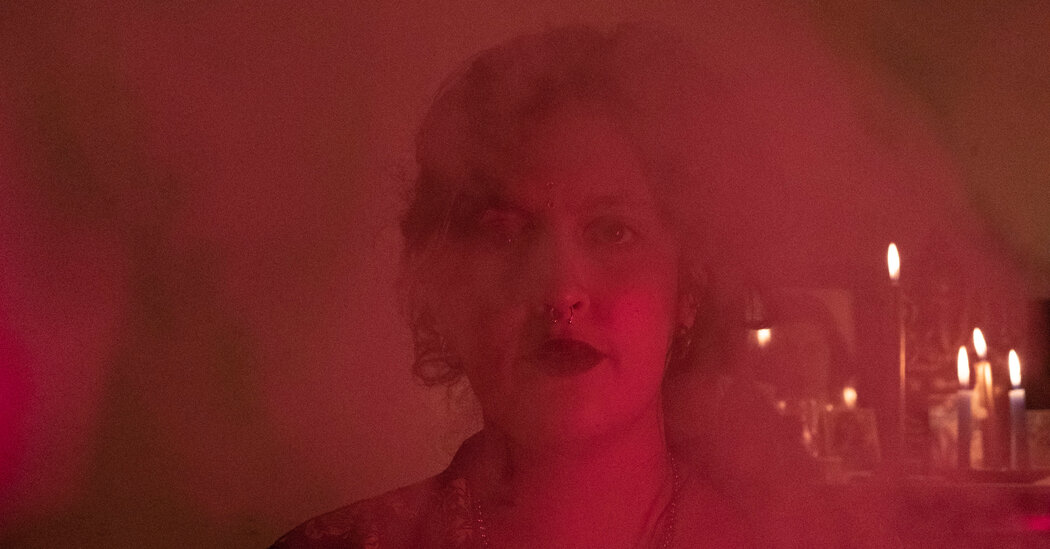Magalí Martínez knew something was off: The seemingly invincible soccer star Lionel Messi was scuffling on the soccer pitch. To her, it looked like he was afflicted with a supernatural curse that has roots in different cultures across history, the “evil eye.”
So Martínez, a self-proclaimed witch and part-time babysitter, got to work. She focused intensely on Messi, began repeating a prayer and drizzled a bit of oil into a bowl of water. If the oil remained dispersed, he was safe. If it collected in the middle, he was cursed.
“It came together like a magnet,” she said. “I knew I wouldn’t be able to cure him alone.”
She went to Twitter and called on her fellow witches across Argentina. “Evil-eye healing sisters, Messi is very affected,” she said. “I need your help.”
A thousand people shared her tweet, with many saying they, too, were witches and would work to protect Argentina’s golden boy.
Argentina has not lost since.
The bookkeepers have set their odds, gamblers have placed their bets and the experts have made their picks for Sunday’s World Cup final between Argentina and France, but their analysis of the matchup — focused on just the 22 players on the field — might not be considering a wild card: Argentina’s army of witches.
In recent weeks, hundreds, if not thousands of Argentine women who call themselves “brujas,” or witches, have taken up arms — in the form of prayers, altars, candles, amulets and burning sage — to protect their nation’s beloved soccer team in its quest to secure a third World Cup title and its first in 36 years.
“We think of ourselves as agents that, from love, can take care, protect and sow happiness,” said Rocío Cabral Menna, 27, a witch and high-school teacher in Messi’s hometown, Rosario, who burns a bay leaf inscribed with her predicted score in a ceremony before each match. The players are competing on the field, she said, and at home, “the witches are taking care of them.”
The trend caught fire after Argentina’s shocking loss to Saudi Arabia in the opening match, causing Argentines to search for any way to help the team on which this nation of 47 million has pitted its hopes.
After that match, several witches started a WhatsApp group to instruct other witches on how to help the national team. They called it the Argentine Association of Witches, or La Brujineta, a play on “bruja” and “La Scaloneta,” Argentina’s nickname for its national team.
“I thought there were going to be 10 people at most,” said the group’s founder, Antonella Spadafora, 23, a witch who runs a convenience store in a city in northwest Argentina. Within days, more than 300 people had joined the group. Last week, there was so much demand that they started a Twitter account. It has gained 25,000 followers in seven days.
“We got tired of being closet witches,” said Andrea Maciel, 28, a witch and graphic designer in Buenos Aires who now helps manage the group.
The witches said their main focus is to use rituals to absorb negative energy from Argentina’s players and exchange it with good energy. That, however, leaves them exhausted.
“Headaches, dizziness, vomiting, muscle pain,” Spadafora said. “We are absorbing all the bad vibes,” she added. “It wears you down a lot, because these are very public figures who have so much negative energy from other people.”
So, to divide the burden, the group leaders now split the witches into groups before every match, each focused on protecting a certain player.
While many of the witches said they are working to look after Messi and his teammates, others are attempting to cast spells on opposing players, particularly the goalkeepers. One ritual involves freezing a slip of paper with the name of a player on it, saying a curse and then burning the frozen paper just before the match.
But the Brujineta group warned that trying to curse France could backfire, particularly because of the team’s star forward, Kylian Mbappé.
“We do not recommend freezing France, as their players are protected by dark entities and the energy can bounce back!!” the group announced on Twitter on Wednesday. “We saw very dark things in the French team and especially in Mbappé. Please share!!!”
The witches focused on the World Cup represent a wide variety of occult disciplines, more New Age than ancient and Indigenous. Practices include black magic, white magic, Wicca, Reiki, Tarot, astrology, and healers of the evil eye and other ailments.
Some women said they were born with special abilities, while others said they developed their skills through study. Several said they began practicing witchcraft as part of a growing feminist movement in Argentina that began in 2018 with the fight for legal abortion.
“I think we all have magic inside,” said Cabral Menna.
But the witches are far from the only Argentines trying to help their team in the supernatural realm. On game days, many more Argentines have been practicing some sort of cábala, or superstition designed to avoid causing any bad luck to their team. The cábalas often involve people sticking to the exact same routine if the team is winning, including where they watch the game, with whom, in what clothes, at what volume and on which channel.
The practice is so mainstream that millions of Argentines likely practice some sort of cábala, a word that derives from kabbalah, a Jewish mystical tradition. Cábalas have been especially pronounced this year after Argentina’s loss in its opening match.
Adrián Coria, Messi’s childhood coach in Rosario and later on the national team, said that he watched the first loss with his family in his living room. Then his wife and daughter sent him to a small cabin in the backyard for the second match. “Alone,” he said. He has since watched the rest of the World Cup there.
Cabral Menna, the witch from Rosario, said she and her mother watched Argentina’s first victory in her mother’s bedroom. “It’s the only part of the house without air conditioning,” she said. “It’s very hot. But we’re not going to move.”
And Sergio Duri, the owner of a restaurant in Rosario with Messi’s signature on the wall, said he now watches the matches in his kitchen with one dachshund, Omar, while his wife watches them in their bedroom with the other dachshund, Dulce. “If this comes out, everybody will know that we’re all completely crazy,” he said. “But these are cábalas, you know?”
The players are also practicing cábalas. Alejandro Gómez, Leandro Paredes and Rodrigo de Paul, three midfielders, have taken to walking around the pitch an hour before kickoff while chewing candy, a tradition they started last year when Argentina won the Copa América, South America’s premier soccer tournament.
So now the question for the witches is: What will happen on Sunday?
“We don’t want to give information as if we have the absolute last word,” Spadafora said. “But obviously we have started working, and obviously we have checked with most of the means at our disposal — esoteric means, for example, pendulums, Tarot, all the divination methods — and it indicates that Argentina is going to win.”
Azucena Agüero Blanch, a 72-year old professional fortune-teller once consulted by former President Carlos Menem, has also explained that she is working with magical stones to ensure an Argentina victory. “Many people who are pushing for Argentina to win have called on me to work on this,” she told an Argentine newspaper.
On Friday night, Martínez was in her candlelit home in Buenos Aires wearing a robe covered in tigers and lighting candles at an altar that included burned sandalwood; Ganesha, the elephant-headed Hindu god; and a photo of Diego Maradona, the late Argentine soccer star who is something like a deity to many in this country.
Martínez said she has a series of methods to protect the national team, including a practice that involves swinging a pendulum, or a wooden cylinder on a string, above a player’s jersey number and then burning cotton doused with a mistletoe tincture. She said she follows the news for updates about players’ ailments and then uses the pendulum to help alleviate them. “The pendulum is the most powerful tool I have,” she explained.
She said she has also had psychic moments during matches. During Argentina’s match against Australia on Dec. 3, she said she had a vision of the Argentine forward Julián Álvarez celebrating a goal.
At 5:13 p.m., she tweeted: “Julian Alvarez I want your goal 🕯👁🕯👁🕯.”
Four minutes later, Álvarez scored.
Natalie Alcoba contributed reporting.



